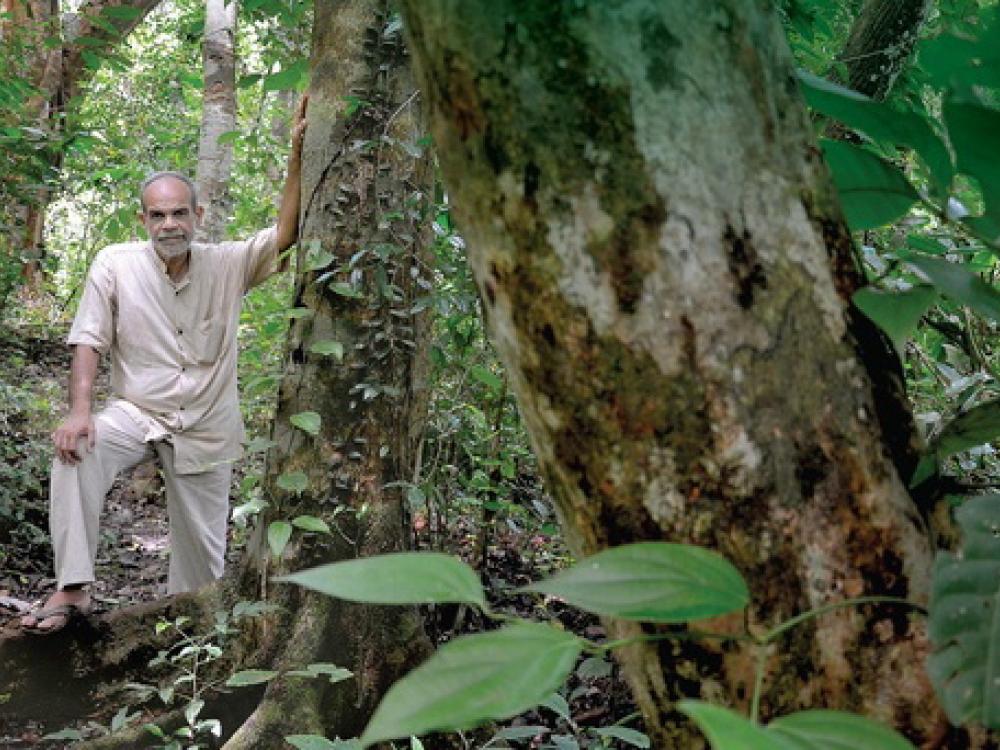
Legendary Indian activist Panduranga Hegde is one of the speakers at UNT’s first international conference on rural sustainability on June 10-11. Courtesy of the New Indian Express.
June 6, 2016
North Texans seeking sustainable solutions for a growing demand for water and energy in the region can learn from world experts when the University of North Texas hosts an international conference unlike any seen hereabouts this week.
It’s UNT’s first international conference on rural sustainability, hosted by the departments of Anthropology and Philosophy & Religion.
On June 10-11, sustainable agriculturists, ecopreneurs and community organizers from rural communities around the world will share their work on the front lines of agricultural innovation – amid climate disruption and globalization.
“In many parts of the world, villagers are departing from ecologically degraded rural environments for overcrowded urban centers,” says Prof. Pankaj Jain, conference co-organizer. “They leave rural ecosystems vulnerable to further exploitation and degradation.”
Local NGOs, he says, are addressing these conditions, enabling villagers to gain a sustainable income from rural ecosystems. Making rural areas more productive, the people are able to remain on their lands and maintain them, via development strategies that protect the local ecosystems.
Practitioners of just such restorative, sustainable development will take center stage at the conference.
Innovators, land stewards and community organizers from nine nations in Latin America, Africa, Asia and the Middle East will present current projects. Some of these apply traditional, sustainable agriculture technologies to save subsistence-farming villages that had been further impoverished by large-scale, Western-style development projects, such as hydro-electric dams and monoculture lumber plantations that destroy fragile forest ecosystems. Their efforts are remediating damaged land, growing food crops adapted to the locale, restoring ecosystems and establishing sustainable green economies.
What makes this conference relevant to North Texas city-dwellers?
“Oddly enough, some things they face are not so different from our challenges,” says Keith Brown, a research assistant in Philosophy & Religion working on the event. “Given the highly unsustainable nature of DFW, how can we bring sustainability into our lives? We want to see how we can apply the methods these people use… Their successes are inspiring people on the outskirts of the cities near them, with how they garden, how they get their water supply and develop wind power and other alternative energy sources.”
The UNT forum intends to foster community-based responses to major global, cultural and environmental pressures, in Dr. Jain’s vision. One means will be to “focus on non-Western ways of thinking, doing and acting” in addressing the repercussions of globalization on rural regions.
Panels of speakers from Colombia, Ethiopia, Ghana, Mexico, Nigeria, Tunisia and elsewhere will address natural resources, eco-entrepreneurship, education, preservation and community engagement. Women’s movements for sustainable communities are represented. A Guatemalan group working with Agronomists and Veterinarians without Borders will participate. (See links below for presenters.)
One of India’s highest honorees keynotes Friday’s events: Anil Prakash Joshi, founder and director of HESCO, the Himalayan Environmental Studies and Conservation Organization, whose mission is to develop sustainable agriculture technologies. HESCO reports it has provided villages with “water mills, composting pits, plant-based medication, herbal pesticides and rainwater harvesting techniques… helped more than 10,000 villages develop beekeeping and fruit…and grain processing as local enterprises,” as well as use local, renewable resources to manufacture furniture and other products.
Dr. Joshi, a previous colleague of Dr. Jain and Philosophy & Religion professor Dr. George James, sparked the conference when he shared with Jain his desire for a symposium that would go beyond the prevalent focus on urban sustainability at United Nations-sponsored conferences. The two UNT scholars responded, successfully landing foundation grants “to bring people all over the world with similar experiences but different techniques in rural areas, to work with urban areas,” recounts Brown. UNT agreed to host the event, and Dr. Alicia Re Cruz, a UNT anthropologist, joined the effort. (Dr. Jain is associate professor in both Anthropology and Philosophy & Religion.)
The conference is also a chance to meet “the first tree-huggers” of India, in the person of legendary Indian activist Panduranga Hegde. Hegde brings the determined movement of Appiko (to hug) to Dallas. Appiko carries on a 25-plus year tradition begun in the Himalayan state of Uttarkhand, of village resistance to forest destruction by hugging trees to save them from being felled by the State. (Outlook India, 6 October 2012). The Appiko movement began to fight monoculture crop-growing in the Western Ghats mountains of South India, and is now known as the “first ever people’s green movement in South India to save our natural resources… A model of sustainable development,” according to Hegde. An Indian “tree-hugger” community recently exhibited at Earth Day Texas.
One hundred or more attendees are expected at the UNT conference. The general public is welcome, and admission is free.
It’s worth noting that this event comes at a time when indigenous leaders around the world are in the news, questioning corporate-supported U.S. and European development projects in their communities. Their resistance has met with armed suppression in southern Mexico, Brazil, Honduras and elsewhere.
But who knows what positive synergy will spark, when eco-activists from around the world come together with North Texas beekeepers, urban gardeners and solar-power engineers?
Rural Sustainability Workshop
When: June 10-11, 8 a.m. to 5:30 p.m.
Where: University of North Texas, Environmental Education, Science and Technology Building, 1704 W. Mulberry St., Denton, TX 76201
Contact: Keith Brown at 940-206-9354 or Keith.Brown@unt.edu.
Sign up for the weekly Green Source DFW Newsletter to stay up to date on everything green in North Texas, the latest news and events. Follow us on Facebook, Twitter and Pinterest.









